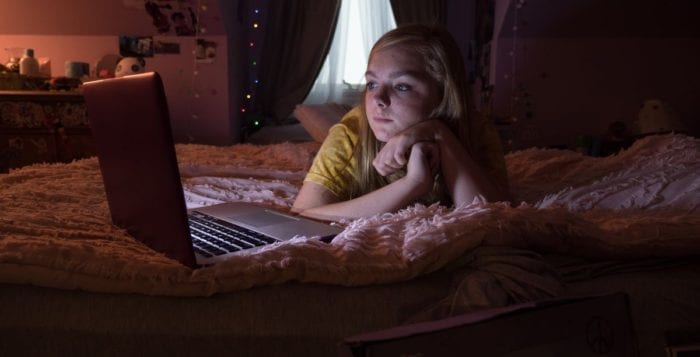By Kyle Barr
There’s something inherently unrealistic in movies about young kids. Everyone remembers “Stand By Me,” where young but intelligent kids with hard home lives take an important step in becoming an adult, or the recent Netflix hit show “Stranger Things,” which plays more as a standing ovation to the media of the ’80s through children who use their pop culture knowledge as a weapon against evil.
Perhaps what’s so unrealistic about them is that they’re made by adults far and away from their youth, looking back on it all with at least some form of fond nostalgia. Those movies centered around kids in the grade school age always seem to say life swings around a single turning point, where kids, who often speak much more eloquently for a person their age, at some point switch from the naiveté of childhood to the outlook of adulthood. It’s a nice thought, if unrealistic.

“Eighth Grade,” written and directed by Bo Burnham, remembers school like most of us do. It was an awkward age where young people are not only trying to learn how to exist as a teenager, but also start becoming an adult. Unlike your usual stock of movies centered around kids, nobody is really learning how to keep it all together, nobody talks like an adult, and everything is in transition.
Thirteen-year-old Kayla Day (played with such exactitude by Elsie Fisher) is just about to finish up her last week of eighth grade, which means soon she will enter the strange and complicated world of high school. Kayla is shy and quiet, but she doesn’t want to be. The teenager makes YouTube videos giving advice in often uncertain terms on how to be brave and outgoing while she herself was voted “the most quiet” of her grade.
Kayla spends time scrolling through social media liking or commenting on other people’s Instagram posts. When she makes YouTube videos, she rarely gets any views. At the dinner table she stares down at her phone, mindlessly shuffling through social media despite her dad, Mark Day (sincerely played by Josh Hamilton), attempting to interact with her. At school, she is just one of hundreds of students with their nose in their phones as she stares longingly at her crush Aiden (Luke Prael.) One day, after being invited to the popular Kennedy’s (Catherine Oliviere) birthday party, Kayla tries to transform herself into the girl she portrays on her YouTube videos, often with results that are both sincere, cringe-worthy and glorious all at once.

What makes the film so compelling and so realistic is the way it portrays Kayla. There is no “Mean Girls” level of commentary. Nobody is looking down on her; instead the audience looks straight at her. She talks like many young girls do, with constant breaks for “umms,” and “likes.” As she stares out the door to Kennedy’s party, the audience is bombarded with kids being kids, of them turning their eyelids inside out, of a girl walking backward on a bridge, all the while the music plays something like out of a dark carnival. Scenes like that strike a very real cord with anybody who grew up around the time of burgeoning social media. Nothing really feels real.
Burnham’s comedy always includes a musical element, and that sense of musical timing is used to full effect in his breakout movie. Every time Kayla sees Aiden, the ambient sound is drowned out by a heavy bass. The musical choices, often listened to by Kayla diegetically through her omnipresent earbuds, are very appropriate for each scene.
Burnham’s final stand-up comedy special “Make Happy” slowly became a commentary about comedy itself. The now-former comedian asked questions of the point of comedy, whether it’s right to make people laugh to forget their problems, even if he himself might not be happy. He baited the audience, often making them laugh before directly insulting them. Really, the show was an expression of how Burnham did not see the performance as “real.” It was his criticism of the entire entertainment industry that goes for glitz and easily digestible media rather than substance.
“Eighth Grade” is Burnham’s answer to those criticisms. I’m glad to say it is a pretty good response, and it will be exciting to see just where all those involved will take their careers in the future.
Rated R for language and some sexual material, “Eighth Grade” is now playing in local theaters.





